“My favorite memory came from my first NCAA tournament in 1975 in San Diego. In a classic semifinal, John Wooden
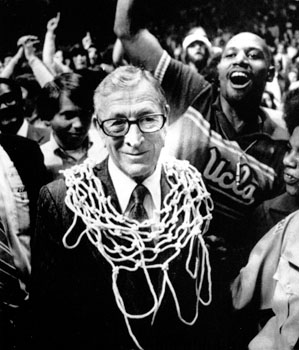 |
Coach Wooden goes out in style in 1975.
Photo by: AP Images |
and UCLA defeated Louisville and his former assistant Denny Crum. I had never been to an NCAA press conference, so after we went off the air with our radio network, I wanted to see what Coach Wooden had to say about the upcoming championship game against Kentucky. Back then, there was hardly any press in the media room. Coach Wooden leaned forward to the microphone and in a low voice said, ‘Monday night will be my last game.’ Somebody in the back said, ‘Coach, what did you say?’ No one knew he intended to retire, not even his family. On that Monday night, Coach Wooden won his 10th title in 12 years.”
— Jim Host, founder of Host Communications, who will be attending his 39th consecutive final four this year
“In 1974, I attended my first Final Four in Greensboro as a representative of CBS Sports, as we sought to make a move into college sports. I watched the famous semifinal game in which North Carolina State upset UCLA, which ended the Bruins’ unprecedented national championship streak. Some 40 minutes after the game ended, I was walking along the top level of the coliseum when I heard voices coming from the floor. Looking down, I realized that the full assemblage of UCLA fans had gathered near the floor exit to the locker room area. Moments later, Bill Walton and the other seniors led the UCLA team back out onto the floor in their street clothes. The pep band broke into ‘Thanks for the Memories,’ and their fans, many in tears, all sang the song in full-throated agreement. In a lifetime around sports, I’ve never seen a more unique and affecting private moment.”
— Kevin O’Malley, a veteran of 40 years in sports television, as an executive in programming and production for CBS and Turner Sports, and as an industry consultant
“When I played in the tournament for Notre Dame in 1989, we had quite a rough matchup against Georgetown, complete with a healthy amount of trash talking. I recall both Dikembe Mutombo and Alonzo Mourning swatting my shot on more than a couple of occasions in a frustrating defeat. Fast forward 20 years to a Gatorade management event in Chicago to kick off the relaunch of the brand under the ‘G’ architecture. I’m director of sports marketing and I’m overseeing our athlete endorsers. Mourning, a former winner of Gatorade’s High School Athlete of the Year, participated in the relaunch. As I’m making a flattering introduction, I tried to make a personal connection with Mourning by saying, ‘Alonzo and I battled fiercely to make it in to the prestigious Elite 8 field.’ A puzzled look came over Alonzo’s face and he said, ‘I don’t ever recall playing against you. Where did you play?’ The audience thought it was pretty funny.”
— Scott Paddock, president, Chicagoland Speedway, and former Irish player
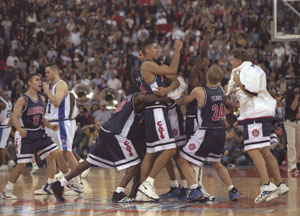 |
Arizona celebrates its 1997 national championship.
Photo by: Getty Images |
“One of my most vivid memories was my first Final Four at CBS in 1997. Arizona had already beaten two No. 1 seeds and then had to take on the defending national champion, Kentucky, which made a three-pointer with six seconds left to force overtime. I was sitting with executives from the Indianapolis Motor Speedway and when that shot went in, I high-fived them so enthusiastically that they almost ended up in the next row. Arizona eventually won, and while watching the victorious players messing up Lute Olson’s always-perfect white hair, I remember thinking, ‘With events like this, I’m really going to like it here at CBS Sports.’”
— Sean McManus, president, CBS Sports
“I had started as a grad school intern at the Spectrum a couple of weeks before the 1981 Final Four .... To say I was wide-eyed would be an all-time understatement. As I arrived at the Spectrum that Monday afternoon prior to the championship game, the building was abuzz because President Reagan had just been shot. It was not long after the shooting that leaders from the NCAA (Wayne Duke, Dave Gavitt, Dave Cawood and others) gathered with the leadership of the Spectrum (Aaron Siegel was the president, Larry Rubin head of PR, and others). I was the intern in the room, getting the coffee and making copies. … I remember how calm the leadership teams from both sides were as they discussed all the possible scenarios. What happens if President Reagan is in a life-threatening position? Would they cancel or delay the game? What happens if the president were to die? They ran through all scenarios, but thankfully we found out that the president would be OK. It was an incredible day and a Final Four I will never forget.”
— Mike Boykin, executive vice president, GMR Marketing
“I had the honor of helping manage [the tournament] for 16 years, and loved every minute. In a 1991 regional semifinal
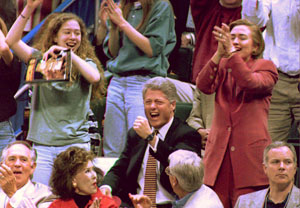 |
President Clinton, Chelsea and Hillary cheer on the Razorbacks in 1994.
Photo by: Getty Images |
in Charlotte, Kansas jumped ahead of Indiana, 16-0. At that point, Bob Knight stormed in grand fury to our seats at the official table and said, ‘Can we please start this [expletive] game over?’ … It was a thrill to greet President Clinton at Reunion Arena in Dallas when he came to watch his Arkansas Razorbacks. ‘Hope we didn’t screw you up too much,’ he said, grinning. … Minutes before the 1993 championship game in New Orleans, I sat at the official table, making notes for next year. Suddenly I felt someone standing in front of me, singing ‘Hail to the Victors.’ It was Dean Smith. Of course, his Tar Heels defeated the Wolverines that night. … Lastly, my favorite tournament memento is a card written in a 7-year-old’s imprecise and yet priceless handwriting. I had answered a friend’s request and found two regional tickets for a child and his father. The boy was battling leukemia. ‘Mr. Hancock, thank you for the tickets so my dad and I could go to the game. It was the best day of my life. Sincerely, your friend Tommy.’ That spring, I learned that Tommy had died three weeks after the Final Four. Each tournament moment, like life, must be cherished.”
— Bill Hancock, BCS executive director and former NCAA tournament director from 1989-2002
“When I was on the selection committee, I was the athletic director at Notre Dame, which meant that I basically represented the independents. Back before there was a TV show for people to watch and find out if they made it or not, we had to call coaches to let them know. Ray Meyer, the coach at DePaul, was one of the nicest guys in the world and there was one year DePaul didn’t make the tournament. It was awful. I thought he was going to cry. I remember leaving the selection committee meetings thinking, ‘I don’t ever want to do this again.’ It was really hard.”
— Gene Corrigan, former Notre Dame AD and former commissioner of the ACC
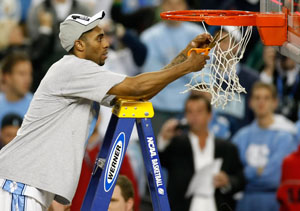 |
Fiskars scissors have been cutting down the nets since the 2009 Final Four.
Photo by: Getty Images |
“In 2008, I took a call from Jay Gillespie at Fiskars. Jay, after watching some of the conference tournament winners hack through the twine with dull scissors, was calling to say that Fiskars would be pleased to provide scissors to cut down the nets at the Final Four. The NCAA signed an agreement with Fiskars to make their orange handles a part of the 2009 Final Four in Detroit. … That year, UNC beat Michigan State and they got to the nets so quickly that I actually had to remove a pair of scissors from Tyler Hansbrough’s hands as he descended the ladder to give he and his teammates the Fiskars scissors. Today, Fiskars supplies the scissors to all six NCAA basketball championships (men and women, Divisions I, II and III).”
— Peter Davis, senior director at BDA, and formerly director of corporate alliances at the NCAA
“I’m a little nervous. I have no idea what March is going to be like for me. The tournament has been the platform on which my dreams have come true. I never thought that in a thousand lifetimes I’d be able to work on something I loved so much. I’ve told the story several times of going to the 1980 Final Four in Indianapolis when I was 12 with my dad and telling him, ‘I’m going to run the tournament one day.’ The tournament has always been that connection with my dad.”
— Greg Shaheen, former NCAA senior vice president
“The experience of attending the 1983 Final Four went from going to Albuquerque to cheer on my alma mater [Houston] to solidifying my aspirations of becoming a broadcaster who desperately wanted to work for CBS Sports one day. Prior to the championship game, I found a seat right next to the CBS Sports set constructed for Brent Musburger. From there, I squeezed my way right up against the set. I could have actually leaned over and shined Brent’s shoes. And I probably would have if he asked. I was so in awe of him. And I had a front-row seat to watch and witness their every move.”
— Jim Nantz joined CBS Sports in 1985. This year will be his 28th year covering the NCAA championship and Final Four.
“When I started working for the National Association of Basketball Coaches in 2004, one of my goals was to celebrate
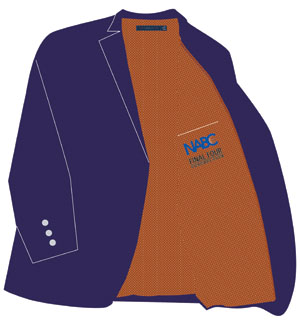 |
| Colony Sportswear designed the sport coats worn by members of the exclusive Final Four Coaches Club. |
the coaches that brought their teams to the Final Four. That led to the creation of the Final Four Coaches Club and its annual luncheon in 2006, an idea I blatantly stole from the Masters and their annual past champions dinner. Each coach in attendance at a Final Four Coaches Club was presented with a blue blazer that had basketball orange lining. All the sport coats look the same, but have gold buttons if they won the championship and silver if they did not. My friend, Pete Waldron, of Colony Sportswear donated the sport coats at cost and we presented a coat to each living member of the Final Four Coaches Club. Billy Donovan’s initial coat had silver buttons from his appearance in the Final Four in 2000 but once he and Florida won the championship in that first year we were pleased to replace his silver buttons with gold. … I get to emcee the FFCC luncheon each Saturday at the Final Four and it’s one of the joys of my life.”
— Rick Jones, founder of Fishbait Marketing, which represents the National Association of Basketball Coaches
“To me, March Madness has always been about undiscovered stars having their chance to seize the moment, grab the spotlight and become household names — remember James Forrest, Bryce Drew and countless others. My favorite, though, is Jacob Tucker of Illinois College [Jacksonville, Ill.], whose dunking prowess was discovered on YouTube and won a fan vote to compete in the 2011 State Farm College Slam Dunk and 3-Point Championship. At 5-10, he not only won the dunk contest in front of a national television audience, but was then signed by the Harlem Globetrotters and even appeared on the “Today” show.
— Todd Fischer, manager of marketing communications, State Farm Insurance
“With Lorenzo Charles’ last-second basket, N.C. State won the 1983 NCAA title and to celebrate, I sent a bottle of champagne to the hotel room of Willis Casey, State’s athletic director at the time. The bell hop returned, saying he was unable to deliver the bottle. Just an hour or so after the game had ended, Willis was already in bed asleep.”
— Ken Haines, CEO, Raycom Sports
 |
John Mellencamp dodged storms to play at “My Coke Fest.”
Photo by: Getty Images |
“During the Final Four in 2006, Indiana-native John Mellencamp volunteered to play a ‘Central Park-style’ concert in downtown. The ‘My Coke Fest’ concert was Mellencamp’s first-ever outdoor concert in Indianapolis and was slated to draw more than 80,000 fans to downtown. That Sunday started mildly enough, but by midmorning, ominous warnings started emanating from the National Weather Service. … As the storms approached that afternoon, Mellencamp had to be coaxed out of his hotel room by then-NCAA President Myles Brand, a friend of Mellencamp’s. Despite storm clouds all around, Mellencamp was energized by his home-state crowd and the performance brought the house down. Almost on cue, as Mellencamp performed ‘Rain on The Scarecrow,’ the rain started. Jack Swarbrick, one of the local organizers in Indianapolis, and I marveled at the sight, shared a high-five and started planning the show’s conclusion as a tornado warning was issued. … Thankfully, no one was injured, and headlines in the Indianapolis Star hailed the concert as one of the most exciting days ever in Indianapolis. That day redefined March Madness for me.”
— Vince Thompson, president and CEO of Melt, an Atlanta event and marketing agency
“Even as a former Florida player, nobody expected Billy Donovan and the Gators to win the 2006 championship. Many of us couldn’t fathom a football school like UF capturing a basketball title. And then to do it again in 2007 with the same starting lineup, beating Ohio State, well, it sparked an incredible amount of pride from Gator Nation. Every year at the start of the basketball season, I write Coach Donovan to wish him luck and thank him for what he has done for the program and the university. I played for the Gators from 1975-79 and had two pretty good seasons and two not so good. But now when I tell someone I played basketball for Florida, there is instant respect.”
— Ric Clarson, senior vice president, PGA Tour
“I have spent 25 years trying to forget my trip to the Final Four. [A semifinal loss to Oklahoma in 1988] was the worst game of my college career. It’s a game that still gnaws at me, and always will. You never forget those moments of regret. It was a phenomenal experience to get there, and a miserable experience to fail.”
— Turner analyst and former Arizona guard Steve Kerr, who went 2-for-13 in shooting against Oklahoma
“It was the greatest 28-hour stretch in NCAA tournament history, with a dizzying swirl of buzzer-beaters, upsets and unlikely heroes that made 2005 regional final weekend stand out. It started with West Virginia taking a 19-point lead over Louisville. All I could think of was ratings shortfall and client make-goods. Louisville came back and won in overtime. Next, Illinois came back from 15 down to beat Arizona in another OT. My professional focus immediately turned to bonus commercials and happy clients. Two more great games the next day, including Michigan State’s double OT win over Kentucky, made me marvel at what I get to do for a living.”
— Chris Simko is working his 19th NCAA tournament as CBS’s chief of NCAA ad sales and corporate marketing
“Selection Sunday nights doing the tournament TV schedule was always an intense time. In the ‘old’ days, the bracket was faxed (the print was so small you could barely read it) and you were always afraid you would misread a name with such small print. ... The wait that night for NCAA approval of the overall TV schedule was often agonizing. There was a lot of cold pizza in the room. And doing regionalization maps ... by hand prior to the introduction of computerized maps was painstaking. You always worried that the lines you drew might unintentionally exclude a market you wanted in a particular region. ... The intensity of the Final Four in person at courtside is also as good as it gets. My son Brett, then 13, was asked by the NCAA to be a ball boy in 2001. His favorite team, Duke, was in the Final Four and he had a courtside seat. I could see him quietly rooting, which I had to ask him not to do. He complied, but I could see it was a struggle. He eventually attended Duke and became a Cameron Crazy.”
— Mike Aresco, Big East commissioner and longtime CBS Sports executive
“The Final Four is like a family reunion every year. It’s a collection of coaches and administrators you don’t get to see much the rest of the year, so it’s the centerpiece of the athletic year, and that interaction is critical for our business. When we were in Indianapolis, we had a dinner at St. Elmo’s in a private upstairs room. This was our big celebration at the Final Four. We were smoking cigars and drinking red wine until 4 in the morning, while we looked out over Illinois Ave., at one of the most iconic restaurants, and personally, my favorite restaurant.”
— Greg Brown, CEO, Learfield Sports









